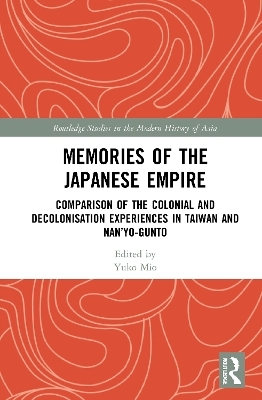
Memories of the Japanese Empire
Routledge (Verlag)
978-0-367-67745-9 (ISBN)
The contributors to this book examine and compare the colonial and decolonisation experiences of people in Taiwan and Nan’yō Guntō – Micronesia – who underwent periods of rule by the Greater Japanese Empire. Early anthropological theory of Western imperialist countries focused on transforming 'savage' cultures by ruling in a high-handed manner. When Japan asserted its hegemony through sudden colonisation, its culture was perceived as inferior to the civilisation indices previously experienced by those it ruled. How did these ruled nations construct their cultural and historical awareness in areas where the strategic design of Japan’s 'civilising mission' was not convincing? After the end of World War II many emerging countries in the Third World achieved independence through various negotiations or struggles with their former colonial powers and built new relationships with their erstwhile rulers. However, after Japan’s defeat, Taiwan and Nan’yō Guntō became ruled by new foreign governments. How did Japan’s reign and transplanted Japanese culture affect the formation of historical awareness and cultural construction of present-day communities in these two regions? This book provides a fascinating ethnographic insight into the effects of empire and colonisation on the historic imagination, which will be of great interest to historical anthropologists of Taiwan, Japan, and the Pacific.
Yuko MIO is Professor at Keio University. She specialises in the anthropological study of East Asia, with an emphasis on folk religion, and the social memory of subjects of the Japanese administration in Taiwan. Her publications include Historical Ethnography of Wang Ye Worship: The Dynamics of Han Chinese Folk Belief in Taiwan (in Chinese, 2018), written Introduction to: The 5th JASCA International Symposium ‘The Internationalization/Globalization of Anthropology in East Asia: Taiwan and Japan’ (2019) and ‘Domestication of Colonial and War Experience: A Case Study of a Japanese Deified in Taiwan’, (in Japanese, 2017).
Introduction PART I Recognition of the Japanese Colonial Era 1. The ‘Japanisation’ of the Taiwanese Lifeworld during and after the Colonial Period: With Reference to Nan’yō Guntō 2. The Realities of Palauan Colonial Experiences 3. Multi-layered ‘Colonial Experience’: Collisions, Contacts, and Re-encounters of the Bunun with ‘Japan’ PART II Living after the War 4. The ‘Crossover Generation’: Residents of Taiwan’s East Coast under Multi-layered Foreign Rule 5. Christian Nursing Care for the Japanese-speaking Elderly in Taiwan: Analysis of the Official Newsletters of Gyokulansou 6. Palau Sakura Kai: An Association of Palauans of Japanese Ancestry PART III Objects and Memories 7. Significance of Heritage in Decolonisation: Taiwanese Colonial Experiences and their Appropriation of Japan’s Imperial-Era Buildings 8. Two Monuments in Majuro Atoll and Economic Development: A Case Study of the East Pacific Monument to the War Dead and the Seion-Kinenhi 9. Multi-layered Realms of Memory: A Diachronic Study of the Commemoration of the the Mudanshe Incident in Taiwan
| Erscheinungsdatum | 07.06.2021 |
|---|---|
| Reihe/Serie | Routledge Studies in the Modern History of Asia |
| Zusatzinfo | 1 Tables, black and white; 8 Line drawings, black and white; 14 Halftones, black and white; 22 Illustrations, black and white |
| Verlagsort | London |
| Sprache | englisch |
| Maße | 156 x 234 mm |
| Gewicht | 344 g |
| Themenwelt | Geisteswissenschaften ► Geschichte ► Regional- / Ländergeschichte |
| Geschichte ► Teilgebiete der Geschichte ► Wirtschaftsgeschichte | |
| Sozialwissenschaften | |
| ISBN-10 | 0-367-67745-8 / 0367677458 |
| ISBN-13 | 978-0-367-67745-9 / 9780367677459 |
| Zustand | Neuware |
| Haben Sie eine Frage zum Produkt? |
aus dem Bereich


